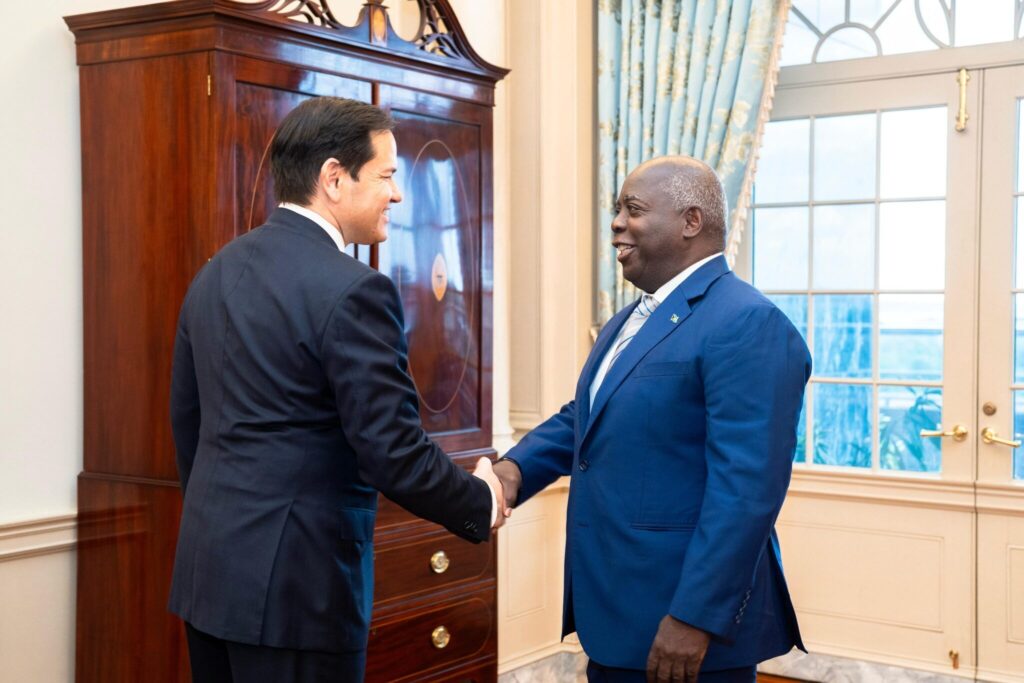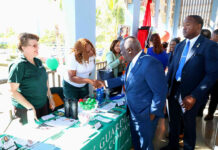
May 7, 2025
“Good afternoon, members of the Press and fellow Bahamians:
As you know, I have just returned from Washington, DC, where I met with senior officials in the United States Government, including Secretary of State Marco Rubio and Secretary of the Treasury Scott Bessent.
The meeting with Secretary Rubio included several fellow heads of government from our region, to discuss – among other topics – shared security arrangements. The meeting with Secretary Bessent was a focused engagement between our two nations.
As you know, I think it is always important that decision-makers in foreign capitals understand the impact of the choices they make on people who live beyond their own borders.
I brought into those meetings with me the perspectives of Bahamians in Cat Island, in Nassau, in Abaco, in Andros, in Spanish Wells, in every part of our nation.
I am gratified to report that our American counterparts expressed a clear willingness to engage with The Bahamas on the issues that matter to us — and not simply to listen, but to act.
This is important because the truth is: many of the challenges we face in The Bahamas are influenced by external factors and forces.
When a young man is shot in Nassau, we know that the weapon was not manufactured here.
When a mother struggles with rising food bills, those prices are shaped not only by local decisions, but by international supply chains, global inflation, and trade policies.
When a nurse resigns from a public clinic because she is recruited by another country – we see the hollowing out of a workforce whose skills we need at home.
And when our financial sector is pressured or sidelined, it is not because of misconduct at home, but because of global rules written without small nations fully at the table.
That is why I went to Washington. To sit at the table. To speak plainly. And to represent the interests of the Bahamian people.
We must be active in shaping how the world sees us and how the world treats us.
In our meeting with Secretary Rubio, we began with security.
We agreed there is an urgent need for enhanced regional cooperation to combat drug and firearms trafficking and illegal migration — all of which are key drivers of violence and instability in our region.
I reiterated that The Bahamas is paying too high a price – in blood, in tragedy — for the guns that come into our country. Weapons trafficked from the United States are fueling violence and threatening the safety of our communities.
We are doing our part. We are protecting our borders. We are strengthening our laws. We are investing in technology and training.
But enduring progress will require collaboration and cooperation with America – including enforcement, tracing, and better regulation of what leaves their ports and ends up on our streets.
To their credit, U.S. officials acknowledged this reality and made a clear commitment to strengthen intelligence-sharing, expand security cooperation, and provide support for border management through programs like the Caribbean Basin Security Initiative and Operation Bahamas Turks and Caicos (OPBAT).
We also discussed the integrity of critical infrastructure projects in the Caribbean. Secretary Rubio encouraged all leaders present to avoid choosing infrastructure partners who could pose security or data privacy risks, a point we take seriously.
We then turned to public services — in particular, healthcare.
There is no question that our nurses are among the best trained and most compassionate anywhere in the world. That is why they are in such high demand.
But when recruitment accelerates and large numbers leave at once, our public clinics and hospitals are left under strain. We feel it in the waiting rooms. In the emergency wards. In the gaps that take too long to fill.
I raised this directly. I said: we understand global demand. But The Bahamas cannot afford to lose its core healthcare workforce without conversation, without coordination, without collaboration.
I found our U.S. counterparts receptive and respectful of that concern. They recognised the pressure we are under, and they expressed a willingness to explore responsible frameworks for discussion and cooperation on healthcare labour.
We addressed the issue of Cuban medical missions, where the U.S. expressed concern about the potential use of forced labour. I assured them that this government is reviewing all related agreements, and that we are committed to upholding labour rights and the rule of law.
With hurricane season approaching, I also welcomed Secretary Rubio’s announcement of the reactivation of two U.S.-administered disaster readiness programs, aimed at improving early warning systems and delivering rapid, life-saving assistance across the region. These will strengthen our emergency response capacity and are a welcome development.
Following that meeting, I held a separate and focused engagement with Secretary of the Treasury Scott Bessent.
There, our conversation turned to the economy — the practical matters of banking, financial reform, and restoring The Bahamas’ standing as a leading, trusted, and responsible financial services jurisdiction.
In recent years, The Bahamas has taken decisive action to restore the standing in our financial services sector. We have passed the laws. We have strengthened oversight. We have done what many said could not be done — and today, we are no longer playing catch-up. We are helping to set the standard.
Over the past decade, The Bahamas’ financial services sector has come under sustained pressure — not because of wrongdoing, but because of shifting international standards, one-size-fits-all blacklists, and policy decisions made without meaningful input from the countries affected. This has amounted to what many of us regard as an unfair and often unbalanced assault on the reputation and viability of our industry.
The impact has been felt not only in boardrooms, but by everyday Bahamians — in lost jobs, diminished competitiveness, and reduced access to essential banking services.
We have responded not with complaints, but with reform. We have passed legislation, enhanced transparency, strengthened regulation, and met the global bar. Now we are calling not just for recognition, but for a new approach — one that respects jurisdictions like ours that are doing the work.
And so we made it clear in Washington: The Bahamas wants to work with the United States — to build a global financial system that is fair, risk-sensitive, and responsive.
Our interests are not in conflict. We both want to stop illicit finance. We both want strong, well-regulated institutions. And we both want rules that support trust, not drive responsible countries out of the system.
That is why we welcomed the U.S. Treasury Secretary’s willingness to engage on the issue of de-risking, and why we will continue pushing for solutions that preserve financial integrity.
This is what real partnership looks like: not just shared goals, but shared responsibility.
The meeting gave us an important opportunity to describe for Secretary Bessent the growing problem of de-risking from the Bahamian perspective — where a small country like ours can do all the right things, but despite complying with international rules, can be cut off from critical banking relationships because of perceived regulatory complexity.
I asked the U.S. to use its influence, not to lower the bar, but to apply the rules fairly. I was encouraged by the response. There was a willingness not just to listen, but to work with us on developing solutions that restore access while preserving global standards.
We also discussed our leadership in digital assets. The Bahamas was an early mover in this space — and now, we are updating our framework as the industry evolves. We agreed there is strong potential for future collaboration — in areas like supervisory technology, financial integrity, and cross-border digital governance.
We addressed the need for continued U.S. support at the IMF, the World Bank, and the IDB, and once again, we were met with affirmation that The Bahamas is seen as a credible, reform-driven partner in the international system.
We also raised the matter of AUTEC, the longstanding U.S. naval installation in Andros.
While we value the strategic defence relationship between our two nations, we must also ensure that Bahamians benefit meaningfully from the economic activity associated with that base.
Our American counterparts were open to further discussion on how to create more pathways for Bahamian contractors and workers to participate — and I will continue leading that conversation personally.
Finally, we turned to regional stability — especially the ongoing crisis and tragedy in Haiti.
The Bahamas is exposed to a disproportionate share of the risks — including increased migration pressures on our borders.
We welcomed the U.S. Government’s recent sanctions against key Haitian gang leaders, but I also made it clear: this is not enough.
Haiti needs solutions that address security, governance, and long-term economic development.
We believe there is a willingness – through bilateral channels and multilateral mechanisms — to build a more stable, secure future for the Haitian people and the region.
In all, I would describe these meetings as important to establishing the kinds of exchanges and relationships necessary for progress.
The most serious challenges we face in The Bahamas are often not entirely of our own making.
We cannot be observers only, when it comes to international policy-making that has an impact on issues like safety, security, and affordability.
We must be participants. And more than that — we can be contributors when it comes to creating shared solutions.
When the world looks for voices of reason, we must be among them.
Thank you. And may God continue to bless The Bahamas.”







